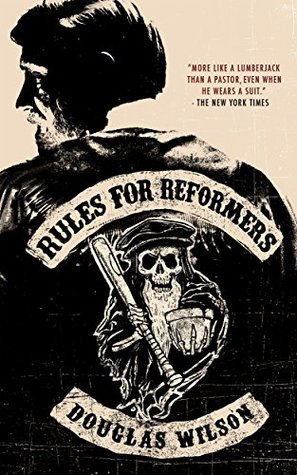More on this book
Community
Kindle Notes & Highlights
We tend to assume that if the existing authorities tell us to do anything short of swearing an oath to worship Satan, then we have to do it. This does not exhibit a mature theology of resistance.
the issue is never the issue. Keep your eye on the ball. What is the stated purpose of the law, and what is the real purpose of the law? The stated purpose of such laws is to keep devastating weapons out of the hands of criminals. The real purpose of the law is to grow the power of the idol-state, and to shrink the power of those capable of resisting it.
At a certain point, some advocates of the “Bible as the only source of morality” paint themselves into a corner. It is like those people who say that because they have a Bible, they don’t need human teachers. But the Bible says that they do need human teachers. So they must be wrong on two counts. First, the Bible establishes human teachers instead of dislodging them, and second, this fact in Scripture is so obvious that if anybody needed a human teacher, it would be the guy who doesn’t see that.
does any element of this natural revelation bring with it any sense of moral obligation? If so, one of the things that natural revelation reveals is law, and calling it natural law doesn’t give me heartburn.
Worship and honor were required by the knowledge that natural revelation brought.
You cannot find a rock or a pebble anywhere that does not command you to worship Him. This is natural law.
not. And this affects the public sphere. As Glen Moots put it, “The idea of a binding moral covenant on all persons, with salutary relevance even for the spiritually unregenerate, gave the covenant of works tremendous impetus for political theology.”
How do we declare the lordship of Christ over all things when a significant number of people are obviously outside the covenant of grace?
But the covenant of creation is a covenant that was made with absolutely all mankind in Adam. The covenant of grace is made with those who are elect in the second Adam. These cannot be the same covenants because they are not made with the same people.
The covenant of grace is made with a distinct subset of those with whom the covenant of creation was made. It must therefore be a distinct covenant. The question is this: is there a remainder left over after the covenant of grace is established? Are these people in the remainder under any covenantal obligations to God at all? The answer has to be yes.
all members of the covenant of grace were parties to the covenant of creation . . . but not all the parties under the covenant of creation are under the covenant of grace.
chariness
when you make a claim about natural law, you are self-evidently talking about the whole world and everybody in it.
I hold to the necessity of natural law in the same way that the Reformers did, and would suggest that there is no way for us to assert the Lordship of Jesus Christ over all things without appealing to it.
One of the stickiest ways to get gummed up is in the matter of glibly assigning responsibility for the causes of this or that.
Without some light from God, we cannot even know we are in the dark,


